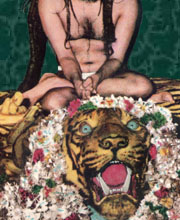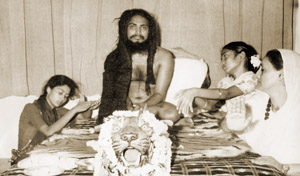Bhava Samadhi — Spiritual Trance
In booklets and biographies of Shivabalayogi written and published since 1961, bhava is always listed as one of the main ways in which Swamiji gives experiences and evokes spiritual awakening.
In 1991, in the meditation hall at the Bangalore ashram, Swamiji was asked, “What is your teaching?” Swamiji simply replied, “Dhyana. Vibhuti. Bhajans. Bhava samadhi.” Swamiji taught through experience, and the experiences he often gave were bhava and bhava samadhi.
Bhava and bhava samadhi, often translated into English as "spiritual trance", refer to a wide range of moods, ecstasy, and loss of ordinary consciousness, even loss of control of one’s own body, that are typically associated with the spiritual path of devotion, bhakti.
Swamiji’s own explanation, when he gave one, was that bhava is through the unseen astral presence of higher spirits.
Bhava is a spiritual phenomenon which is best understood through experience, but we can try to describe some of its manifestations.
One cannot explain the inexplicable. Bhava has to do with the spirit and the mind cannot comprehend the spirit. Those who experience bhava say it is different each time.
There is a powerful connection between ecstatic music and ecstatic experiences.
Bhava is only a Sanskrit word for a universal phenomenon known to the ancients and many spiritual traditions throughout the world, whether Christian, Sufi or traditional.
Conventional Attitudes towards Bhava
According to convention, bhava is either something a beginner on the spiritual path should move beyond, or a profound experience attained only by the advanced. Trouble is, Shivabalayogi gave the experience generously to all kinds of people. He consistently emphasized its authenticity and its value.
The Strange and Disturbing Appearance of Bhava
For some, bhava appears strange and creates disturbances. Swamiji asked that trance devotees be stopped from disturbing others. But to others, including Shivabalayogi, bhava is an expression of play in addition to a profound spiritual experience.
Bhava: Skeptics and Divine Play
Swamiji often had a little fun with skeptics, including his own mother.
One must be concerned that bhava can develop ego and become an obstacle to spiritual growth. All spiritual practices and experiences, even meditation, come with these warnings.
Swamiji acknowledged that some people acted as if they were in bhava, but he forbade devotees from questioning or trying to judge bhava samadhi. “You watch their behavior and from that you will come to know whether it is true or not.”
Swamiji himself referred to a history of discouraging and suppressing spiritual trance. Several times he gave the example of Jesus giving bhava and how that was suppressed after Jesus was murdered.
Links to pages that contain Shivabalayogi's own explanations of bhava samadhi, articles on bhava samadhi, and many videos showing how generously Shivabalayogi evoked the spiritual experience.
Short four and a half minute video of bhava samadhi.
Read about different experiences of bhava samadhi and what Swamiji had to say on the subject in any of the books on Shivabalayogi, in the Bhava Samadhi pages of the Shiva website, and what Shivabalayogi had to say about bhava samadhi in the Bhava Samadhi pages of Quotes from the Source this Shivabalayogi website.
![]()
This is the Bhava Samadhi Home page │ NEXT page

